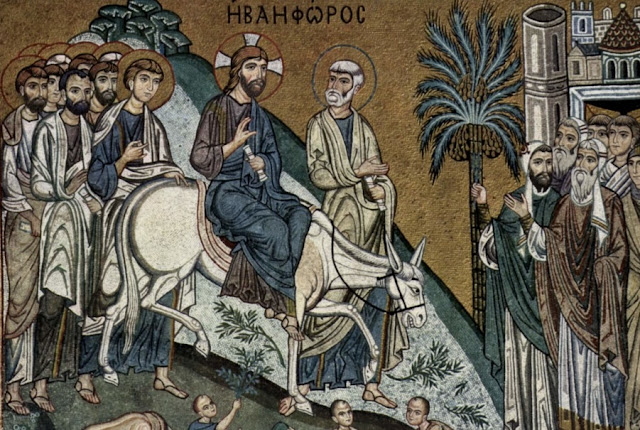Holy Monday
Behold, the Bridegroom comes in the middle of
the night, and blessed is that servant whom He shall find watching, but
unworthy is he whom He shall find in slothfulness. Beware, then O my soul, and
be not overcome by sleep, lest thou be given over to death and shut out from
the Kingdom. But return to soberness and cry aloud: Holy, holy, holy art Thou,
O God: through the Theotokos have mercy upon us.
Troparion
About the Icon:
Jesus and
the Five Wise Virgins stand on the roof of the house that they have entered for
the wedding party. These five women had extra oil to keep their lamps burning
until the Bridegroom, Christ, arrived.
The Five
Foolish Virgins standing outside the house had no extra oil and their lamps
went out just as the groom was arriving.
The extra
oil is actually the good things that we do and the valuable company that we
keep; this is the oil that makes sure that our lamp, our faith, is always lit,
as we wait for our Bridegroom.
Holy Monday Evening. The Service of the
Bridegroom
Introduction to Holy Monday, Tuesday,
Wednesday
The first
part of Holy Week presents us with an array of themes based chiefly on the last
days of Jesus' earthly life. "The story of the Passion, as told and
recorded by the Evangelists, is preceded by a series of incidents located in
Jerusalem and a collection of parables, sayings and discourses centered on
Jesus' divine sonship, the Kingdom of God, the Parousia [Second Coming], and Jesus'
castigation of the hypocrisy and dark motives of the religious leaders."
The
Orthros [Matins] Service of Holy Monday, Tuesday and Wednesday is called the
Service of the Bridegroom, and gets its name from the central figure in the
well-known parable of the Ten Virgins (Matthew 25:113). The title Bridegroom
suggests the intimacy of love. It is not without significance that the Kingdom
of God is compared to a bridal feast and a bridal chamber. The Christ of the
Passion is the Divine Bridegroom of the Church. The imagery connotes the final
union of the Lover and the beloved. The title, Bridegroom, also suggest the
Parousia.
Each day
of Holy Week has its own particular theme. The theme of Monday (celebrated in
anticipation on Palm Sunday evening) is that of the barren fig tree (Matthew
21: 18-20) which yields no fruit and is condemned. On Tuesday (celebrated
Monday evening) the theme is on the vigilance of the wise virgins (Matthew 25:
1-13) who, unlike their foolish sisters, were ready when the Lord came to them.
On Wednesday (celebrated Tuesday evening) the focus is on the sinful woman
(Matthew 26: 6-13) who repents. Great emphasis is made in the liturgical
services to compare the woman, a sinful harlot who is saved, to Judas, a chosen
apostle who is lost. The one gives her wealth to Christ and kisses his feet;
the other betrays Christ for money with a kiss.
Some suggested activities for families:
Make a
point to attend services with your children. Make time to read the
"theme" gospel lessons before coming to services, since they are not
part of the Gospel reading, but only referred to during the service. Speak with
your children about Christ's Second Coming, ie., that "He will come
again" as we recite in the Nicene Creed. Jesus reminds us during the first
three days of Holy Week, as was done on many occasions during Lent, that we
must be watchful and repent while there is still time.
Holy Tuesday (Celebrated on Holy Monday
Evening)
Behold, my soul, the Master entrust thee with
a talent. Receive His gift with fear; make it gain interest for Him; distribut
to the needy, and make the Lord thy friend. So shalt thou stand on His right
hand when He comes in glory, and thou shalt hear His blessed words: “Enter,
servant, into the joy of thy Lord.” I have gone astray, O Savior, but in Thy
great mercy count me worthy of this joy.
Aposticha
On Great
Tuesday the Church calls to remembrance two parables, which are related to the
Second Coming. One is the parable of the Ten Virgins (Mt 25.1-3); the other is
the parable of the Talents (Mt 25.14-30). These parables point to the
inevitability of the Parousia [Second Coming] and deal with such subjects as
spiritual vigilance, stewardship, accountability and judgment.
From
these parables we learn at least two basic things. First, Judgment Day will be
like the situation in which the bridesmaids (or virgins) of the parable found
themselves: some ready for it, some not ready. The time one decides for God is
now and not at some undefined point in the future.
The
tragedy of the closed door is that individuals close it, not God. The exclusion
from the marriage feast, the kingdom is of our own making. Second, we are
reminded that watchfulness and readiness do not mean a wearisome, spiritless
performance of formal and empty obligations. Most certainly it does not mean
inactivity and slothfulness. Watchfulness signifies inner stability, soberness,
tranquility and joy. Watchfulness is the deep personal resolve to find and do
the will of God, embrace every commandment and every virtue, and guard the
intellect and heart from evil thoughts and actions. Watchfulness is the intense
love of God.
By Fr. Peter Orfanakos
Source: http://orthochristian.com/69890.html

















CONVERSATION